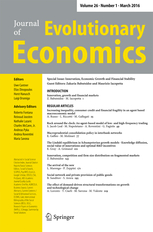
Towards a Theory of Climate Innovation - A Model Framework for Analyzing Drivers and Determinants
In this article, we describe the results of a multiple case study on the indirect corporate innovation impact of climate change in the Central German chemical industry. We investigate the demands imposed on enterprises in this context as well as the sources, outcomes and determining factors in the innovative process at the corporate level. We argue that climate change drives corporate innovations through various channels. A main finding is that rising energy prices were a key driver for incremental energy efficiency innovations in the enterprises’ production processes. For product innovation, customer requests were a main driver, though often these requests are not directly related to climate issues. The introduction or extension of environmental and energy management systems as well as the certification of these are the most common forms of organizational innovations. For marketing purposes, the topic of climate change was hardly utilized so far. As the most important determinants for corporate climate innovations, corporate structure and flexibility of the product portfolio, political asymmetry regarding environmental regulation and governmental funding were identified.




